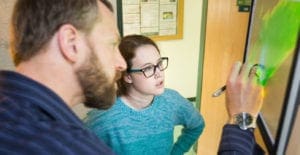Whale watching. For some it may bring to mind school field trips or coastal vacations. Fanny packs and binoculars. Long stretches of ocean and searching eyes, with the hope that maybe, just maybe, one of the largest animals on earth will appear in the waters below.
But for Laurel Sullivan (‘18), whale watching is both all of these things and none of these things at once. Whale watching isn’t just a pastime for Laurel — it’s conservation. Science.

Laurel Sullivan (’18) and Dean Pieter deHart review her bathymetric maps in his office recently.
“There’s nothing like it. It’s why I do what I do,” she says emphatically, describing the inherent awe in the arch of a whale’s massive body, stretching as high as a building into the sky, before it crashes gracefully back down into the water. “I’m at my happiest when I’m watching whales and when I’m on a boat in the middle of the ocean.”
During an internship with the New England Aquarium the summer between her sophomore and junior year, Laurel witnessed breaches, flipper slapping and lob tailing day after day on whale-watching boats. She used these graceful, sometimes playful activities to educate visitors on the beautiful marine mammals in front of them, while also collecting and transcribing data of their identification, location, and behavior. Laurel spent hours on whale-watching boats. She loved every minute of it.
When school started back up again that September she spent every weekend for the next three months commuting down to Boston to continue her internship — a six and a half hour round trip. At that point, Laurel knew she had to allow her passion to drive the next step in her education.
So, with support from advisors Dean Pieter deHart and Associate Professor Tom Mullin, Laurel has spent the last few months comparing eight years of baleen whale sighting data in the Bay of Fundy with the underwater depth of the bay at different points in the tide cycle. Using GIS, Laurel overlaid these datasets onto bathymetric maps that will eventually allow her to make conclusions on whether whale location in the Bay of Fundy is related to the tides.
Besides the standard scientific paper on her findings, those conclusions will lead Laurel to a unique end goal: suggested guidelines and interpretive materials for local whale watching companies in the Bay of Fundy. Inspired by her time educating whale watchers, Laurel wanted to be able to communicate her findings to a variety of audiences. Maps, she says, are just more visual. They allow people to understand concepts without necessarily understanding the complex math behind them. And making solid, helpful, scientific suggestions for whale watching companies in the Bay of Fundy could have “a real effect on those businesses,” according to Dr. deHart.
Whale watching is not just a fun pastime — the tourism it brings presents an economic opportunity for many communities around the world. And there’s no better opportunity than in the midst of wonder in seeing a whale to bring the value of their existence to the forefront, according to Laurel.
“People may see whales and think it’s cool, but the guides have to make that important for them. Why are the whales here? Why are they important?” Laurel says. “The Bay of Fundy is a feeding ground, so it’s especially important in this area to help people understand and care about conservation.”
While the whale sighting dataset at the base of Laurel’s research was provided and collected by Dr. deHart from a Bay of Fundy field course he led, Laurel also pursued her own whale location data. This past summer, she spent three days whale watching with companies on the Bay of Fundy in Saint Andrews, New Brunswick, Lubec, Maine, and Campobello Island, New Brunswick with funding from Unity College’s Student Academic Engagement Fund and Holt Scholarship.
“Going into the field to collect data is an important part of the process. It lets you connect with nature; connect with the whales and local companies, and get out of the lab and out from behind a computer screen. It’s important that Laurel had that experience,” Dr. deHart said. “She’s also helping me practice what I preach — I always tell my students, ‘Don’t collect data just for the sake of collecting data!’ I have always wanted to do something with this dataset, and now Laurel is putting it to work.”
As a captive wildlife care and education major, Marine Mammalogy isn’t a required part of Laurel’s curriculum. Neither is an applied thesis. But that hasn’t stopped her from embracing both.
“I have more pictures of whales on my phone than I have pictures of me,” she says with a laugh. “All my friends give me a hard time because I’m definitely the whale kid on campus. I’m always like, ‘So with the whales…’ and they’re like, ‘Please stop.’”
“I’m having a blast. This is not what I ever expected to be doing. This is so much better than just writing a paper.”



